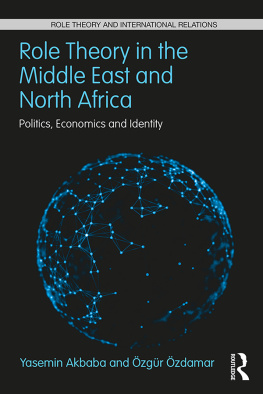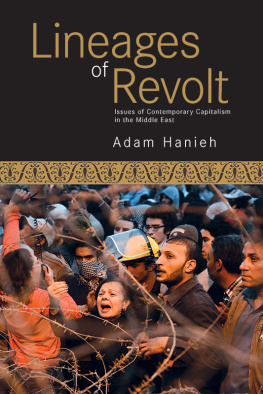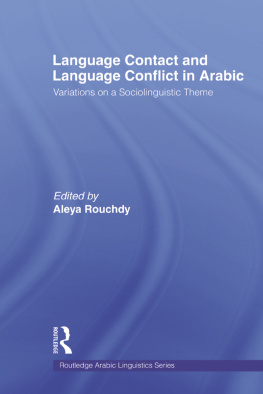Language and Society in the Middle East and North Africa
Studies in Variation and Identity
Language and Society in the Middle East and North Africa
Studies in Variation and Identity
Edited by
Yasir Suleiman
First Published in 1999
by Routledge
2 Park Square, Milton Park,
Abingdon, Oxon, OX14 4RN
Routledge is an imprint of the Taylor & Francis Group
Transferred to Digital Printing 2006
Editorial Matter 1999 Yasir Suleiman
All rights reserved. No part of this book may be reprinted or reproduced or utilised in any form or by any electronic, mechanical, or other means, now known or hereafter invented, including photocopying and recording, or in any information storage or retrieval system, without permission in writing from the publishers.
British Library Cataloguing in Publication Data
A catalogue record of this book is available from the British Library
Library of Congress Cataloguing in Publication Data
A catalogue record for this book has been requested
ISBN 0700710787
Publishers Note
The publisher has gone to great lengths to ensure the quality of this reprint but points out that some imperfections in the original may be apparent
Dr Muhammad Hasan Amara
Bar Ilan-University, Israel
Dr idem Balim-Harding
Manchester University, England
Dr Friederike Braun
Christian-Albrechts-Universitt Zu Kiel, Germany
Dr Raghda El-Essawi
American University in Cairo, Egypt
Dr Said Faiq
University of Salford, England
Dr Hlne Gill
University of Westminster, England
Professor Jacob Landau
Hebrew University, Israel
Dr Ibrahim Muhawi
Edinburgh University, Scotland
Dr John Perry
University of Chicago, USA
Professor Bernard Spolsky
Bar-Ilan University, Israel
Ms Camelia Suleiman
George Washington University, USA
Professor Yasir Suleiman
University of Edinburgh, Scotland
Dr Hanna Tushyeh
University of Bethlehem, Palestine
Dr Enam Al-Wer
University of Essex, England
Dr Alison Wernberg-M11er
Edinburgh University, Scotland
This volume of selected papers has its genesis in a symposium on the relationship between language and society in the Middle Eastand North Africa held in Edinburgh between 1 and 4 July 1997. I would like to thank the contributors to this volume for revising their papers and for putting up with my queries and requests for changes (and yet more changes!) which, in some cases, have led to contributions that are vastly different from those that were presented at the symposium. I would also like to thank Linda and Toby Morris for all their help in producing the final version of this volume. Thanks are also due to Jonathan Price, Curzon Press for his constant support and encouragement, and to Jane Muhawi.
I am grateful to my wife Shahla who has worked tirelessly to help speed up the production of the final version of this volume at a time when I was heavily engaged in a major research project. My two sons Tamir and Sinan deserve a special word of thanks for allowing me to use many a week-end to finish editing this volume. I hope that one day they will be able to understand and intellectually appreciate what their father who complained of a sore neck from long hours of gazing at the computer monitor was doing during their 1998 summer holidays.
Yasir Suleiman
Yasir Suleiman
This is the third volume in a series of studies whose aim is to elucidate the role of language in society in the Middle East and North Africa. The first volume Arabic Sociolinguistics: Issues and Perspectives (Curzon Press, 1994) sought to investigate issues of identity, language loyalty and variation as they pertain to Arabic in both the modern and pre-modern worlds. The second volume Language and Identity in the Middle Eastand North Africa (Curzon Press, 1996) dealt with therole of language in articulating issues of national and ethnic identity in relation to Arabic, Berber, Hebrew, Kurdish, Turkish and a host of Central Asianlanguages. The present collection of papers builds on the findings and premises of these two volumes by (a) linking the facts of variation in language use to issues of identity, (b) adopting an expanded definition of the Middle East which includes the Central Asian republics of the former Soviet Union, and (c) considering the use of Middle Eastern languages in their diasporic existence. The languages which form the main focus of this volume are Arabic, Berber, Persian, Turkish and, to a lesser extent, English as a language of international communication in the Middle Eastern context. However, the majority of the papers deal with Arabic, with special emphasis on issues of language, variation and identity as they pertain to the Palestinians in Jordan, the Occupied Territories and Israel.
Broadly speaking, current research on the sociolinguistics of Middle Eastern languages, especially Arabic, has tended to concentrate on correlating variation in language use with demographic factors such as education, social class, age, and sex/gender. Some of the papers in this volume, for example those by Amara, Amara et. al and El-Essawi are cast in this tradition. More recently, emphasis on issues of language and identity in the Middle Eastern contexthas begun to emerge in four ways. First, attempts have been made to link the facts of variation directly to issues of personal and, more significantly, collective identity in its ethnic and nationalist manifestations. The papers by Suleiman, Al-Wer and Camelia Suleiman in this volume are examples of this orientation. Second, other authors have attempted to link the issue of collective identity in its two guises above to questions of ideology, the debate over modernisation and the formation of the nation-state out of the state-nation. The papers by Gill, Faiq, Balim-Harding and Perry constitute examples of this macro-orientation to the study of language and identity. Third, a few studies have recently aimed to concentrate on issues of language loyalty and identity shift or identity modulation among Middle Eastern and North African communities in the Western world. The papers by Landau and Wernberg-Mller in this volume represent this orientation on the macro- and micro-levels respectively. Fourth, a few scholars have chosen to broach issues of language and identity from a much wider perspective of language in society by using the insights of, for example, feminist theory and folkloristics. The papers by Braun and Muhawi are examples of this orientation in its current embryonic state.
This multiplicity of themes and approaches and their interaction is a characteristic feature of this volume. Papers thus may cross the boundary between one orientation and the other in a manner which shows both the complexity and richness of the study of language in the Middle Eastern and North African cultural and socio-political landscape. To help the reader situate these papers in relation to each other, the rest of this introduction will be devoted to outlining the major points in each of thepapers in this volume.








 la All
la All umrih
umrih